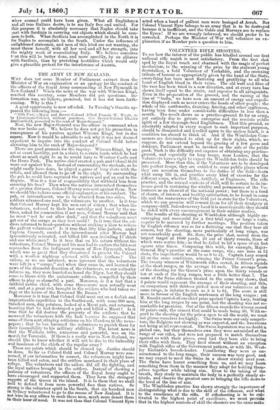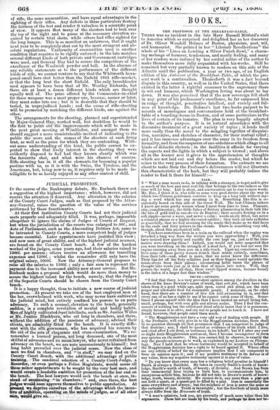VOLUNTEER RIFLE SHOOTING.
To see how the interest of the public has kindled around our first national rifle match is most satisfactory. From the first shot sped by the Royal touch and charmed with the magic of perfect mechanism, to the winning of the prize by the stalwart young deerstalker, a bold Volunteer of Yorkshire, and the crowning tribute of honour so appropriately given by the hand of the State, everything has been most flattering and gratifying to all who boast of English blood in their veins. The old weft and fibre of the race has been tried in a new direction, and at every turn has shown itself equal to the strain, and superior to all antagonists. Even in the preparation of the ground, and the raising of the line of " butts," we have seen an amount of energy and expedi- tion displayed such as never enters the heads of other people ; the whole of the earthworks, draining, fencing, and other appliances, having been done under considerable difficulties in less than a month. The result shows us a practice-ground fit for an army, yet entirely due to private enterprise and the resolute public spirit of a few thorough-bred Englishmen. That this ground, so admirably adapted in every respect to such important purposes, should be dismantled and levelled again to the useless heath, is a condition too absurd to think of. And if the Wimbledon Com- moners are determined to stick up for their rights, which, we suppose, do not extend beyond the grazing of a few geese and donkeys, Parliament must be invoked on the side of the public good. Such is the difficulty and expense of obtaining any practice- ground, and especially for long range, near London, that the Volunteers have a right to expect the Wimbledon butts should be preserved. More than this, if the Volunteers are to be developed into perfect troops, they are entitled to some public places where they can accustom themselves to the duties of the field—learn what camp life is, and practice every kind of exercise for the different corps, whether Rifle, Artillery, or Engineers. The rifle practice, and the annual contests of skill, will be certain to do im- mense good in sustaining the vitality and permanence of the Vo- lunteers as an element of the national power ; but there is a fund of charm, of interest, and healthy satisfaction, to be found in camp life and the manmuvres of the field yet in store for the Volunteers, which we can promise will reward them for all their drudgery at company-drill. Indeed on every hand it is most desirable they should be aided with every encouragement in their soldier studies. The results of the shooting at Wimbledon although highly en- couraging and successful for a first trial upon so large a scale, require to be matured by further meetings. The position taken by English riflemen was so far a flattering one that they beat all corners, but the shooting, more particularly at long range, was not remarkably good. Mr. Ross, the prize shot, scored from the largest target at 1000 yards, 24 out of thirty rounds, three of which were centre hits ; so that he failed to hit a space of six feet square nine times. Comparing this with, for example, Major- General Hay's practice at the same range, viz., one miss in 12 shots, the imperfection would be as 9 to 4. Captain Lacy scored 22 on the same conditions, winning the Prince Consort's prize. The twenty winners of Whitworth rifles scored, in fifteen rounds at the short ranges, on the average 15 each. The average %cab of the shooting for the Queen's prize upon the thirty rounds or ten at each of the long ranges, was a little better than 7. The score of the Swiss riflemen treated in the same way shows, that 5 points would represent the average of their shooting, and this, on comparison with thirteen picked men of our volunteers at the same range, is inferior to ours as 5 is to 61. The score is still more in favour of the English marksmen at the long ranges ; yet. M. Knecht carried off one chief prize against Captain Lacy, beating him at the long ranges by one point, but the shooting was not re- markable for precision. Out of the fifteen rounds the winner scored 10 points only, the utmost that could be made being 30. With re- gard to the shooting for the prizes open to all the world, we must not plume ourselves too highly. The Swiss were our only competi- tors, the Belgians not showing as was expected, and the Americans not being at all represented. The Swiss deputation was no doubt a picked one, but they themselves own they were astonished at the range of our rifles, and were not prepared to match themselves against us with their pieces, even had they been able to bring their rifles with them. They fired almost without an exception with English rifles of the Government pattern, or with Mr. West- ley Richards's breech-loader. Considering they were so un- accustomed to the long range, their success was very good, and we may expect to meet the Swiss in a closer rivalry next year. The Swiss have learnt something from us, and we may learn something from them in the manner they adopt for holding them- selves together while taking aim. Even to the taking of the breath, they study to maintain the body in a perfectly steady at- titude, and observe the greatest care in bringing the rifle down to the level of the line of aim.
The Wimbledon practice has shown strongly the importance of distinguishing what is due to the skill of the rifleman, and what to the excellence of the rifle. If rifleshooting is to be cul- tivated to the highest point of excellence, we must provide that in the highest contests of skill the shooters use the same make
of rifle, the same ammunition, and have equal advantages in the sighting of their rifles. Any defects in these .partioulars destroy the fairness of the test and render it valueless in a scientific point of view. It appears that many of the Shooters had to look, over the top of the sight and to guess at the necessary elevation re- quired by certain trial shots, while others had rifles sighted for the long ranges;'. This is so manifest an unfairness, that it ought next year to be completely shut out by the most stringent and ab- solute regulations. Uniformity of ammunition used is another condition that-requires to be rigidly enforced ; in the late matches several different kinds of both private and Government cartridges were used, and General Hay had to assure the competitors of the excellence of the Woolwich powder and ball. In the absence of any reliable statements as to the performance of the different kinds of rifle, we cannot venture to say that the Whitworth hexa- gonal small bore shot better than the Enfield 1853 rifle-musket, or that the long beat the short Enfield. The only breechloader used 'appears to have been that of Mr. Westley Richards, but there are at least a dozen different kinds which are thought equally well of. The prize offered by the Commander-in-chief for those weapons was a most proper one, because, sooner or later, they must come into use ; but it is desirable that they should be tested, in unprejudiced hands ; and the cause of rifle-shooting will be promoted by matching the different kinds, one against the other.
The arrangements for the shooting, planned and superintended by Major-General Hay, -Worked well, but doubtless he would be the-first' to' point the improvements which will be made in the next great meeting at Wimbledon, and amongst them we should suggest a more unmistakeable method of indicating to the public the score and the names of the shooters at each firing tent, as well as the prize for which they are contending. With- out some understanding of this kind, the public cannot be ex- pected to show that lively interest in the shooting they were evidently disposed to feel had they known clearly which was the: favourite shotz and what were his chances of success. Rifle shooting has in it all the elements for becoming a popular pastime with ns, as it is with the 'Swiss, the Tyrolese, and the Americans, but, being new to us, it requires only to be made in- telligible to be as keenly enjoyed as any other contest of skill.



























 Previous page
Previous page